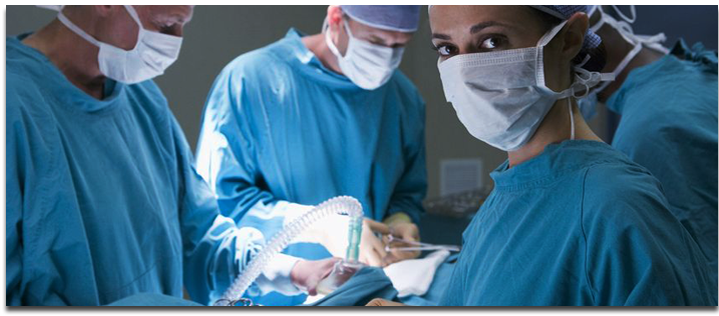


![]()
Diagnostic Laparoscopy
1. What is diagnostic Laparoscopy?
Ans: Many times it is difficult to make an accurate diagnosis of the condition in the abdome and the patient may have atypical symptoms or complex symptoms. Even though your surgeon has a fair idea about your illness he may not have exact proof of your illness. This can be obtained by inserting a small telescope into your abdomen via a small incision around your belly button and inside of your abdomen inspected. This confirms the surgeonís diagnosis and at the same time necessary treatment be made so you are cured of your illness.
2. Why is my diagnosis not clear?
Ans: Many a times the lesions in the abdomen are small and not easily detected by routine imaging modality. Other times they are situated deep within the abdomen or in between organs when they are difficult to pin point. Some times in cases such as cancers the spread is accurately determined by laparoscopic examination and unnecessary surgery can be avoided if additional information about spread is noted on laparoscopy. Sometimes diseases such as, tuberculosis of abdomen is present which is not easy to diagnose unless you see the typical lesions in the abdomen which can be easily done using a laparoscope.
3. How long does it take to recover?
Ans: it usually takes less than 24 hrs to be fit for discharge from hospital. In case additional procedures are performed for some illness detected during the procedure it may take a bit longer. You will be able to perform your routine daily activity within a day or two.
Laparoscopic appendicectomy
1. Why should I undergo surgery for appendicitis? Can I be cured by medicines?
Ans:Appendix is a small tubular structure attached to your large intestine. It can get infected which leads to appendicitis. It causes pain in the right lower abdomen, vomiting and fever. Patients are advised surgery at the earliest because if the infection progresses the appendix can burst and then the infection can spread into the abdomen and also into blood. This is a very serious condition and patient can even loose his life if it is not treated promptly and aggressively. Hence surgery should be done promptly to avoid complications. Medicines can at best try to control infection but there is no guarantee that it will cure appendicitis. There is always chance of recurrent infection hence surgery is the best and permanent cure for appendicitis.
2. Should I undergo laparoscopy or open surgery?
Ans: Laparoscopic surgery offers the advantage of less opst-operative pain, faster recovery and better cosmetic outcome. Wound infection retes are very less in laparoscopic surgery compared to open surgery. Also laparoscopy offers additional advantage that entire abdomen can be inspected especially in females with right lower abdomen pain because they may have associated ovarian or uterine disease. This can only be observed in laparoscopic surgery. In open surgery we cannot see the pelvic organs unless we make a very big wound.
3. Is it safe to undergo laparoscopic appendicectomy? Will the disease
recur after surgery?
Ans: Laparoscopic appendicectomy is a very safe surgery. Minimal risk of complications cannot be ruled out but it is same as in any other surgery. Appendicitis once treated by surgery does not recur.
4. How many days rest do I need after surgery?
Ans:In a routine case you will be discharged from the hospital within 48hrs. You can resume your normal duties within 3-4 days of your surgery. There is no need of prolonged rest as you will be comfortable walking around and doing your work soon after your surgery.
Laparoscopic Cholecystectomy
1. Why is there a need for me to undergo cholecystectomy (gall bladder removal)?
Ans: Can you remove only the stones and leave behind the gall bladder? Gall bladder stones are formed in patients due to a problem in the gall bladder function. Even though the stones are the ones causing pain and infection; if you leave behind the gall bladder new stones will form as the gall bladder itself is abnormal. Hence the gall bladder is removed along with the stones to cure you. These stones can get infected causing severe pain, vomiting and fever in patients. The stones may slip down and block the flow of bile into the intestines causing jaundice. In diabetic patientís rapid life threatening infection can occur hence surgery should be done if stones are detected in gall bladder irrespective of any history of pain in the abdomen. Surgery is indicated at the earliest to avoid all these complications.
2. What is the advantage of laparoscopic gall bladder removal?
Ans: Laparoscopic cholecystectomy is the most advantageous surgery when compared to open surgery. Here four small holes are made in the abdomen and surgery performed to remove the gall bladder with stones. It is a very safe surgery. In open surgery an incision 7-10 cms long is made just below the rib cage on right side which takes long time to heal and is very painful. After lap cholecystectomy the patient is fit for discharge within two days where as in open surgery he may have to be in hospital for 5 to 7 days and full recovery will take another two weeks.
3. Iím having jaundice and have been told to have gall stones. Can I undergo
the surgery?
Ans: If you have jaundice and gall stones that means that one of the stones may have slipped down into your bile duct (which takes the bile from liver to intestines) has been blocked due to stone. You need to undergo a procedure called ERCP where the stone blocking the bile duct will be removed by endoscopy and then laparoscopic surgery will be performed to remove your gall bladder. This procedure can be performed during the same hospital admission.
4. Is there a chance for disease recurrence after surgery?
Ans: No. the disease is completely cured after the surgery. You will not have recurring symptoms after the procedure.
5. Is it an expensive procedure?
Ans: The cost of surgery is bit more than open surgery but if you look at the benefit of less pain and early recovery, it is better than open surgery because even though the open surgery cost is less there is prolonged recovery and loss of work for more days in open surgery. You can go back to work sooner and loss of earnings due to surgery is much less in laparoscopy.
Laparoscopic hernia surgery
1. Can hernia repair be done by laparoscopy?
Yes. Hernias can be of various types such as groin (Inguinal) hernia, umbilical hernia, epigastric hernia, incisional hernia etc. almost all types of hernia can be repaired by laparoscopy. The advantage of laparoscopy is faster recovery and less chances of recurrence. In open surgery there is up to 10% chance of recurrence of hernia but it is only up to 2% in laparoscopic repair. Also it is of great benefit for patients who have had failed surgery for hernia by open method. It is also best for patients who have hernia on both sides because using three small holes both side hernias are repaired at the same time. In open surgery there are two wounds on both groin for the same surgery and the recovery is slow.
2. I have a swelling around my belly button. Is it a hernia? Can it be
treated by laparoscopy?
Ans: The condition you may be having is umbilical hernia (should be confirmed by your family physician or surgeon). There is a small defect in the abdominal wall through which intestines tend to come out when you strain or cough. This can produce pain in the abdomen. Surgery is needed because sometimes intestines can get caught in this hernia and cause serious complication. A medical device called mesh will be placed over the defect and defect closed. Again the chances of recurrence are much less than open surgery.
3. I had undergone an open surgery many years back and now I have a swelling over
the scar of my surgery. It is occasionally painful and sometimes I have vomiting and
pain in around the scar. I am told I have incisional hernia. Can this be treated laparoscopically?
Yes. Your symptoms are of incisional hernia. This can be treated by laparoscopy.
4. Can I go for gym after surgery?
Ans: Routine activities such as walking, swimming and cycling are encouraged as soon as the patient is comfortable. Heavy exercises and lifting weights are best avoided for up to three months of surgery. Smoking should be avoided as much as possible before and always after surgery. There is a higher chance of recurrence of hernia in smokers.
Advanced laparoscopic surgery
1. What surgeries can be performed through laparoscopy?
Ans: Many of the surgeries which were traditionally performed by open surgery can now be performed by laparoscopy. Surgeries such as fundoplication (for reflux esophagitis), cancer of esophagus and stomach, cancer of intestine, cancer of rectum, rectal prolapse can all be performed safely and with great benefit to the patient. It has been proved for most diseases that laparoscopic surgery is safe and more beneficial to patients than open surgery by various international studies.
2. What is bariatric surgery?
Ans: Obesity is a disease that is not coming to India in a big way due to westernization. Lot of peopleare overweight and many are obese. They suffer from co-morbid conditions such as sleep apnoea, diabetes mellitus, hypertension, joint pains (especially knee pain), infertility and higher risk of cancers. All these associated conditions and obesity can be corrected by surgery. In this technique the patientís ability to take and digest food is limited by surgery. Hence patients take in fewer calories and lose weight. This surgery is followed up by cosmetic surgery for the patients because they have lot of excess skin after rapid weight loss in the post-operative period.
3. Are all patients candidates for these advanced procedures?
Ans: Although many of the surgeries which were performed earlier by open method are now being performed by laparoscopy, the selection of patients who should undergo laparoscopy can be best judged by your surgeon once he examines you and goes through your investigations reports. Certain diseases may not be ideal candidates for advanced laparoscopic procedures due to advanced disease, poor general health of the patients and so on. But most of the patients can safely undergo laparoscopic surgery in todays practice.
4. What will be the cost of these procedures?
Ans: As you are aware these advanced procedures are performed by few individuals who have to use several advanced and latest medical equipment for performing the procedure, it will logically be more expensive. Most of the times the cost is due to medical single use equipment which is directly charged to the patients. The doctors and hospital charges are almost comparable in both open and laparoscopy. The equipment charges and the cost of general anesthesia are the ones that drive up the overall bill to the patient. In our institute however there are packages for most routine surgeries. These are very nominal compared to any tier I city or metros. We are able to keep the cost low because of the number of cases that we operate so we can pass on the benefit of laparoscopic surgery to the patients.




